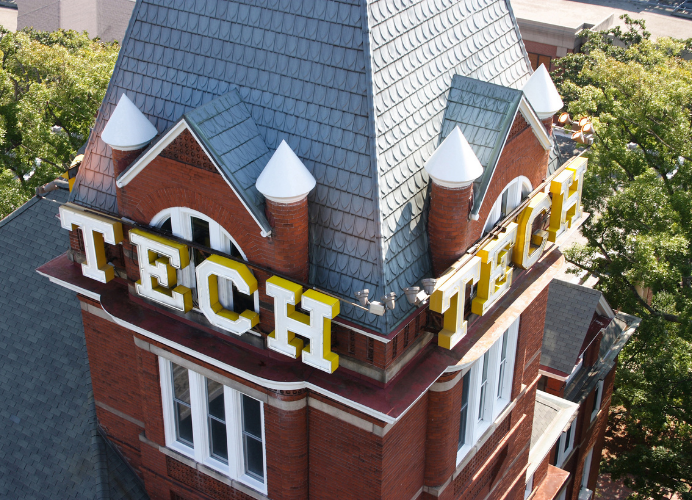- You are here:
- Home
April 21, 2022
For the conference website including schedule, abstracts, and recordings, please visit the conference website.
A Topology and Geometry conference run completely by graduate students took place in April at Georgia Tech. The organizers of the conference were Katherine Booth, Sally Collins, Sierra Knavel, Daniel Minahan, Anubhav Mukherjee, Agniva Roy, Thomas Rodewald, Roberta Shapiro, Weizhe Shen, Hugo Zhou, and Xingyu Zhu. Prof. Jen Hom was the faculty advisor and PI for the NSF grant, and help was also provided by SoM staff Melissa Raine and April McCruel.
The Topology and Geometry Conference is one of the only conferences that are organized by, attended by, and feature primarily graduate students in geometry and topology. There were more than 130 participants, and over twenty students were given the opportunity to speak, while several others either presented posters or gave virtual talks that were be featured on the conference website. There were also nine invited speakers, faculty or early career researchers that are well established in their fields who presented their work. These faculty were also available via virtual office hours or in-person interactions with participants. Graduate students were given a great opportunity to form connections with peers and personally interact with pioneering researchers in their fields. There were also many subfields that were represented, opening opportunities for conversations and collaboration between participants.
We had an opportunity to speak with two of the organizers, Agniva Roy and Roberta Shapiro, and ask a few questions about the importance of the event.
Roberta Shapiro
What will it mean for the students who participate in the conference?
There haven't been any in-person conferences for the last couple years, which is nearly half of what students spend in grad school. That means that people had fewer chances to connect with others, get to know the community, and network. In the past, students have made connections at GSTGC that led to collaborations. I'm hoping that this year, students have the chance to do this but also meet other grad students in their area -- the same grad students who will soon be postdocs, professors, lecturers, and generally coworkers at potentially the same institutions.
What does it mean for your career to be able to organize a conference at this level?
Any future career -- academic or otherwise -- will involve a massive amount of organization and paperwork. I feel lucky to have had the chance to, for example, learn to write a grant before my livelihood depends on it. Moreover, I feel like we, as a group, have a chance to improve on past years' conferences and make potentially make the GSTGC more useful and enjoyable for participants.
Agniva Roy
What does it mean for your career to be able to organize a conference at this level?
For me it has been a fulfilling experience thus far, forming connections both inside the department and outside with faculty we are inviting. My short career thus far has been really helped by conferences I have been able to attend, and it is good to learn what goes into putting one together. Organising conferences and events is a big part of being a professional mathematician, and the opportunity to do this now is an avenue to learn how to balance research and this aspect of our work.
What support have you received from SoM faculty or staff to help with the organization?
Faculty and staff have been immensely helpful. Prof Jen Hom, who is the PI for the NSF grant we have applied for, has been readily available with answers and advice. The staff have been unbelievably helpful, enthusiastic, and patient, notably Melissa Raine, April McCruel, and Kimberly Stanley, who have been helping with space booking, grant writing, and general organisational issues.
What will it mean for the students who participate in the conference?
This is one of the only conferences that are organised by, attended by, and feature, primarily graduate students in geometry and topology. 24 students will get the opportunity to speak, while several others will either present posters or give virtual talks that will be featured on the website. Further, 9 invited speakers, who are faculty or early career researchers, who are well established in their fields. will present their work. They will also be available via virtual office hours or in-person for students to interact with them. Thus this presents graduate students a great opportunity to form connections with peers and personally interact with pioneering researchers in their fields. We expect many subfields to be represented, opening opportunities for conversations and collaboration.

